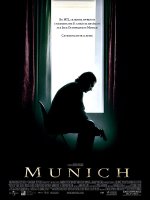Munich: going beyond the obvious polarity
 I watched the movie Munich last night, and found it far more interesting and engaging than I had expected.
I watched the movie Munich last night, and found it far more interesting and engaging than I had expected.
Personality reacting
For one, it allowed me to see my own reactivity surface around some of the issues in the movie.
My personality reacts to any form of blind and stupid revenge, retaliation and use of violence, especially when it is very likely to just fuel more bloodshed, so there was a wish there for the main characters to be taken out early - knowing that would not happen.
It is actually interesting how my personality tends to have reverse sympathies, often for those others don't have much sympathy for. I guess it is the sympathy for the underdog, whomever or whatever that may be in the situation.
Shifting views
And of course, as the movie set the stage for, there was also sympathy coming up for the main characters since we got to see at least two of them (the main character and his wife) in a more relaxed universally human setting.
In the beginning, they were set up as the good guys fighting the bad guys, in the familiar way. Yet, as the movie went along, it all got more complex.
In the safehouse conversations, we got a glimpse into the views of the Others, and they turned out to be human and having some good points as well. They may even be acting exactly as I would in their situation.
And we - the audience along with the main character - started to see that maybe this strategy of killing off opponents left and right may lead to more opposition, hatred and bloodshed on both sides.
Going beyond the polarity
I thought this was one of the strengths of the movie, and where it went further than most - at least US made - movies out there. It took us from the usual polarity of us versus them, and into a place where we see the similarities between us and them.
We are not so different. If I were in their situation, I would probably do exactly what they are doing. And if they were in my situation, they would probably do what I am doing.
Similarly, in the way Israel and Mossad responded to the Munich situation, they were exactly mirroring the terrorists, their opponents. They became the mirror image of their opponents.
This is a given these days, when people are a little more psychologically savvy: We become what we hate. Or rather, I have it in me anyway, and by shutting it off in myself, seeing it just in others, and blindly reacting to it in others, I set myself up to blindly live it in myself.
And we see it all around.
Becoming the terrorists
In the way the US reacted to 911, they themselves became the mirror image of the terrorist, although with one difference: Since they have far more resources and support around the world, they only do it at a far larger scale. Instead of less than 3,000 killed, they have killed - or been responsible for the killing of - tens of thousands, maybe hundred of thousands. In the process, they predictably and effectively erode whatever sympathy is left for the US, fuel resentment and hatred against the US, and recruit new terrorists worldwide - in far greater numbers and fueled by far more hostility. It is a suicidal approach.
There are of course situations where forceful measures, even war, is needed. But this was clearly not one of them.
This is where the movie led as well: All this blood will come back to us.
In the grips of irrationality
Why does it happen? Because we are in the grips of emotions. When there is a blind projection, we have little choice but to live out whatever would rather see in others than in ourselves.
And how to loosen it up and find release from it? Through taking a sober view at what is going on. If we support violence against those we perceive as our opponents, are we not doing excatly what they are doing? If our soldiers kill large number of civilians, are they much different from the original terrorists? How am I doing what I see in them? How am I living what they are living?
In seeing this more clearly, there is a release from blind reactivity and emotions. There is the space for a more rational approach, for more sane choices. They may still involve forceful tactics if that seems needed, but now at least from a different view and with more ability to let go.
Of course, it doens't help that the US now has a government which systematically uses this form of irrationality for their own purposes, a government that uses fear as a strategy for getting their policies through. And that the US has a media that to a minimal extent question what is going on, and function more as stenographers than anything else.
Inquiry
Some statements for inquiry for myself...
They shouldn't use violence to get their way.
They shouldn't act in a blindly reactive way.
They should see how violence turns itself towards those using it.
They shouldn't use fear tactics to get their way.
The US media and public shouldn't be so stupid and unquestioning.
Labels: movies, politics, projections